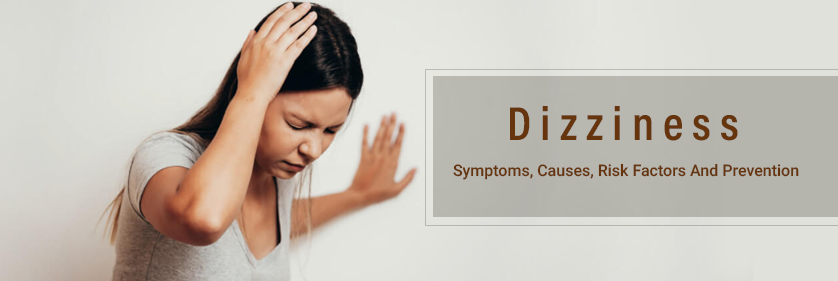Dizziness – Symptoms, Causes, Risk Factors and Prevention
Dizziness is the sensation of being lightheaded, woozy, or unbalanced. It affects the sensory organs, particularly the eyes and ears, and it can also cause fainting. Dizziness is not a disease, but a symptom of different disorders.
Vertigo and disequilibrium may cause dizziness, although these two words reflect different symptoms. Vertigo is described by a sense of spinning, as the room is moving.
It can also sound like a disease of motion, or as though you are leaning to one side. Disequilibrium describes a lack of balance or order. Real dizziness is the feeling of lightheadedness, or nearly fainting.
Dizziness is normal and generally is not severe about its underlying cause. Occasional dizziness is not to be thought about. When you experience frequent bouts of dizziness for no apparent cause or for a prolonged time, you should call your doctor immediately.
What Are the Symptoms of Dizziness?
The person can feel faint with dizziness, near passing away, frail, nauseated, confused, exhausted, shaky, off-balance, or any combination of these. Individuals can experience a shifting, spinning, rocking, or whirling sensation of themselves or the room (possible vertigo).
Sometimes, dizziness comes with other symptoms, such as:
- Faintness (“lightheadedness”) or actual fainting
- Weakness or tiredness
- Confusion
- Feeling off balance
- Headache or head pressure
- Pain in chest or chest tightness
- Nausea or vomiting
When to Seek Medical Attention for Dizzy Spells?
Seek medical attention if you experience any unexplained, recurrent, or severe dizziness. If you experience vertigo or dizziness along with the following symptoms you should call 911 or go to the emergency room:
- Significant head injury
- A new, different or a severe headache
- A fever higher than 101°F (38.3° C)
- A very stiff neck
- Blurred vision
- Sudden hearing loss
- Speech impairment
- Leg or arm weakness
- Loss of consciousness
- Falling or difficulty walking
- Pain in chest, or fast or slow heart rate
What causes dizziness?
A number of conditions can cause dizziness because balance involves several parts of the body. The brain gets input about movement and your body’s position from your:
- Inner ear
- Eyes
- Muscles
- Joints
- Skin
Inner ear disorders are frequently the cause of feeling dizzy. The most common causes include benign paroxysmal positional vertigo (BPPV), Meniere’s syndrome and ear infections.
Risk factors
Factors which can increase your risk of dizzy include:
- Age: Older adults are more likely to have dizzying medical conditions, particularly a sense of unbalance. They’re also more likely to take medications that can cause dizziness.
- A past episode of dizziness: When you have felt dizziness before then, in the future you are more likely to get dizzy.
What are the potential complications of dizziness?
Because dizziness can be due to serious diseases, failure to seek treatment can result in serious complications and permanent damage. After the underlying cause has been identified, it is crucial that you follow the treatment plan specifically tailored for you and your health care provider to minimize the risk of future complications including:
- Brain damage
- Heart failure
- Loss of hearing
- Loss of vision
- Paralysis
- Spread of cancer
- Spread of infection
Prevention
Following some tips will help you overcome dizziness without taking medicine. Preventive steps include:
- Be mindful of the risk of an imbalance or fall that will allow you to hold the accident away
- Switch off the light and, if you experience vertigo, lie down or sit down; That will make you feel better
- Reducing the use of salt, alcohol, and caffeine, as the disease worsens
- If you feel regular dizziness, do not drive or handle heavy machinery
- If you experience dizziness after taking a common medicine, consult your doctor immediately
- Avoid overt heat exposure in summer, as it causes overheating and dehydration
- Avoid waking up from bed unexpectedly after you lay down or turn around in a hurry

